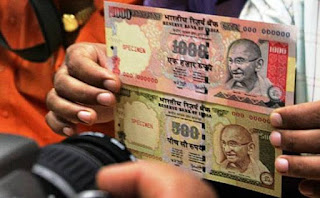Banning high denomination notes: What will be its impact on common man? Will it lead to end corruption? What else should be done?
Demonetization is one of the greatest rewards to honest and worst punishment to corrupt and holders of black money.
The decision of the government to scrap biggest bank notes – Rs.500 and Rs.1000 – has been welcomed by the common man, aimed at combating corruption and black money but this move will cause short-term pain and chaos for the working class, small businesses and nearly anybody who deals with cash on a daily basis.
The RBI has taken all possible steps to avoid inconvenience to the public as well as to the businessmen by allowing the online transactions. However, the decision of slow strategy of replacement of notes will be troublesome.
Modi’s historical decision to decommission notes will not ideally hurt most individuals in the long-term although it will have a significant negative impact on the working class and small and rural businesses in the short term.
No doubt, it is a meaningful step to unearth black money but at the same time the decision of the government is a shocking for those who are daily earner and would be finding difficulty in the absence of small denomination notes in the market.
Economist Ajit Ranade’s back-of-the-envelope calculation shows that the highest face value in India should be around Rs. 250; simply put, Rs. 250 is the highest-value note that most Indian individuals should need.
What will be its impact on common man?
The decision is likely to put inconvenience to common people, almost half of the population who are not well conversant with the card transactions, who will start running to the nearby bank to exchange the currency notes.
The most affected people are those who are already on some pleasure trips during these days and likely to move in the coming days.
The decision has been taken without studying the situation properly which could create a host of problems especially when the festive and marriage season are ahead.
The farmers’ class – whose paddy crop has been harvested and marketed and sowing whet and other rabi crops are under progress – and majority of them in rural India doesn’t have access to a bank account – estimated 200-300 million people – and depends upon high-value cash transactions will be crippled until new notes come in the market.
Since this will reduce the total currency circulation in the market, it will lead to deflation and the gold prices, stocks and commodities will drop.
Moreover, with the heavy deposits with the bank, more lending could be possible and deflation and inflation will balance in the future with long term interest of the country comfortably.
Will it lead to end corruption?
Barring difficulty to the common man during the period of deposit and withdrawing new currency from the banks, it will definitely help the government to fight black money, corruption, terrorism and counterfeit currency with one single bold and historical decision of the Modi Government besides choking the terrorist related activities, arms smuggling and spying.
Keeping aside the as to how India’s black money is in forms other than currency or physical notes such as gold, land, jewellery or any other form of wealth, the banning of notes will tackle the black money that is in the form of hard cold cash but will not affect other forms of black money.
It is also likely to bring more transparency in the Indian real estate industry making it more attractive for domestic and foreign investors.
In case the supply of smaller notes are constrained in the days and weeks ahead, it is likely to put quite a number of people in a pickle.
Frankly speaking, demonitization is one of the greatest rewards to honest and worst punishment to corrupt and holders of black money. But, it is not understood as to why this step has been taken in haste when the UPI (Unified payment interface) system is likely to be full operationalised only by January 2017. It would have been better to wait until them if the move to ban the higher denomination notes is also to stimulate India’s shift towards a cashless economy.
At the same time, in a report made public, the SIT also suggested capping the cash holdings of companies and individuals at Rs.15 lakh. If accepted by the government, both these measures could check cash transactions, ensure a paper trail for every high-value transaction and prevent tax evasion. High-value transactions in cash are a common feature, especially in the real estate sector where buyers try to get away with lower stamp duty.
To clamp down on black money, government should introduce cashless transactions by fixing a little higher limit following recommendations from the Supreme Court appointed Special Investigation Team (SIT).
In this high tech era, slowly and gradually, the economy is getting digitized and ultimately moving towards a cash less economy. Electronic transactions ensure a clear money trail and make it very difficult for tax evaders. In fact, it is a good idea to start with bigger transaction and extends it to smaller transactions gradually once you give a facility to everyone to transact through electronic means.






